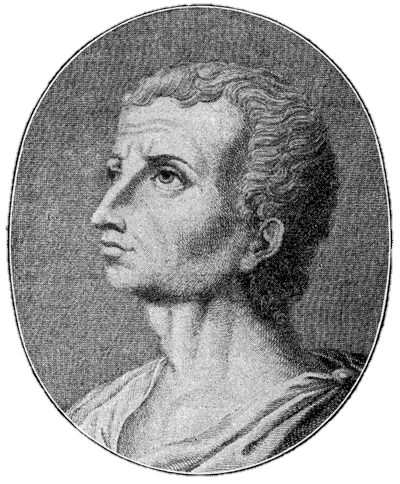Book XXVIII, sec. 27
History of Rome
Titus Livius: Idézetek angolul
“Favor and honor sometimes fall more fitly on those who do not desire them.”
Book IV, sec. 57
History of Rome
Book XXII, sec. 25
History of Rome
“Are you going to offer yourselves here to the weapons of the enemy, undefended, unavenged? Why is it then you have arms? And why have you undertaken an offensive war? You who are ever turbulent in peace, and laggard in war. What hopes have you in standing here? Do you expect that some god will protect you and bear you hence? A way is to be made with the sword. Come you, who wish to behold your homes, your parents, your wives, and your children; follow me in the way in which you shall see me lead you on. It is not a wall or rampart that blocks your path, but armed men like yourselves. Their equals in courage, you are their superiors by force of necessity, which is the last and greatest weapon.”
Vos telis hostium estis indefensi, inulti? quid igitur arma habetis, aut quid ultro bellum intulistis, in otio tumultuosi, in bello segnes? quid hic stantibus spei est? an deum aliquem protecturum uos rapturumque hinc putatis? ferro via facienda est. hac qua me praegressum uideritis, agite, qui uisuri domos parentes coniuges liberos estis, ite mecum. non murus nec uallum sed armati armatis obstant. virtute pares, necessitate, quae ultimum ac maximum telum est, superiores estis'.
Book IV, sec. 28
History of Rome
“Good fortune and a good disposition are rarely given to the same man.”
Book XXX, sec. 42
History of Rome
“The Aitolians, the Akarnanians, the Macedonians, men of the same speech, are united or disunited by trivial causes that arise from time to time; with aliens, with barbarians, all Greeks wage and will wage eternal war; for they are enemies by the will of nature, which is eternal, and not from reasons that change from day to day…”
Aetolos Acarnanas Macedonas, eiusdem linguae homines, leues ad tempus ortae causae diiungunt coniunguntque: cum alienigenis, cum barbaris aeternum omnibus Graecis bellum est eritque; natura enim, quae perpetua est, non mutabilibus in diem causis hostes sunt...
Liber XXXI, 29, 15
“There is nothing worse than being ashamed of parsimony or poverty.”
Book XXXIV, sec. 4
History of Rome
Book XXIV, sec. 22
History of Rome
“The most honorable, as well as the safest course, is to rely entirely upon valour.”
Book XXXIV, sec. 14
History of Rome
“We can endure neither our vices nor the remedies for them.”
Nec vitia nostra nec remedia pati possumus
Praefatio, sec. 9
History of Rome
“You know how to vanquish, Hannibal, but you do not know how to profit from victory.”
Book XXII, sec. 51
History of Rome
“They are more than men at the outset of their battles; at the end they are less than the women.”
Book X, sec. 28
History of Rome
Book II, sec. 39
History of Rome
Forrás: History of Rome, Book XXXIV, sec. 4
“Toil and pleasure, dissimilar in nature, are nevertheless united by a certain natural bond.”
Book V, sec. 4
History of Rome
Book III, sec. 39
History of Rome
“We do not learn this only from the event, which is the master of fools.”
Book XXII, sec. 39
History of Rome
